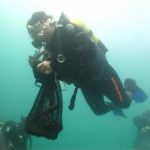There are almost countless opportunities throughout the day for you to have a positive impact not only on the health of our oceans but on the health of our planet in general; you just have to know where to look. As divers we want our oceans, lakes, and streams to stay as clean as possible so that we may enjoy diving in them for years to come. Here are five of the top things we think scuba divers can do to help our planet's bodies of water stay clean.
1. Reduce your carbon footprint
Your carbon footprint is the total amount of greenhouse gas emissions caused by your individual activity expressed as carbon dioxide.
You can actually calculate your total carbon footprint on some websites such as this one on Nature.org. Here you can calculate your total carbon footprint either individually or as a household and donate an equal amount of money in proportion to your estimated footprint to offset your carbon emissions.
Ways to decrease your carbon footprint include:
- Drive less (cars emit tons of carbon dioxide) - try to walk, ride a bike, carpool, or take public transportation when possible.
- Drive a low carbon vehicle
- Fly less (airplanes emit even more carbon than cars)
- Use ENERGY STAR appliances at home
- Turn off your lights!
- MANY MORE ways can be found here at COTAP.org
2. Reduce your plastic usage
Plastics are the ocean's biggest enemy. Every year 8 million tons of plastic are dumped into our oceans. Watch this heartbreaking trailer all about it from the Plastic Oceans Foundation:
Ways to reduce your plastic usage:
- Bring your own shopping bags
- Use your own travel mug for that daily cup of coffee
- Refuse plastic straws
- Stop using disposable water bottles - use a refillable one!
- Recycle! Recycle! Recycle!
 3. Organize a beach clean-up
3. Organize a beach clean-up
Don't worry, if you are land-locked, you can still have a beach clean up at your local lake, river or reservoir. You can do this as a large group activity, or just make it a point to go pick up trash every time you visit your local beach.
4. Use less fertilizer
The overuse of fertilizers has become a major issue concerning our oceans. Fertilizer runs off into our waterways, eventually making its way to the oceans, creating what is called a "dead-zone." The fertilizer causes low oxygen levels in the water where no aquatic life can survive. So when gardening use as little fertilizer as possible and eat as locally as possible.
5. Be water wise
All water on Earth is connected so treat it carefully. Be wise as to what you put into your water before it runs down the drain. Use non-toxic cleaning products, low-phosphate detergents, biodegradable soaps, shampoos and conditioners, etc. Also use less water!
Here are some ways to reduce your water consumption:
- Rinse and clean dishes with your faucet on low power.
- Turn off your water when not using it (rinsing, brushing teeth, etc.)
- Take 5-minute showers, not baths
- Fix faucet and toilet leaks
- Install low-faucet aerators and water-saving shower heads
- Only wash full loads of laundry and dishwasher dishes
 We could go on and on about ways to conserve our resources, but as you can see, there are a plethora of opportunities for you in your daily life to help reduce waste, conserve water, and improve your carbon footprint; all of which will lead to you saving our oceans one person at a time. The next step is for you to start doing all of these tips and to share what you've just read with a friend.
We could go on and on about ways to conserve our resources, but as you can see, there are a plethora of opportunities for you in your daily life to help reduce waste, conserve water, and improve your carbon footprint; all of which will lead to you saving our oceans one person at a time. The next step is for you to start doing all of these tips and to share what you've just read with a friend.






